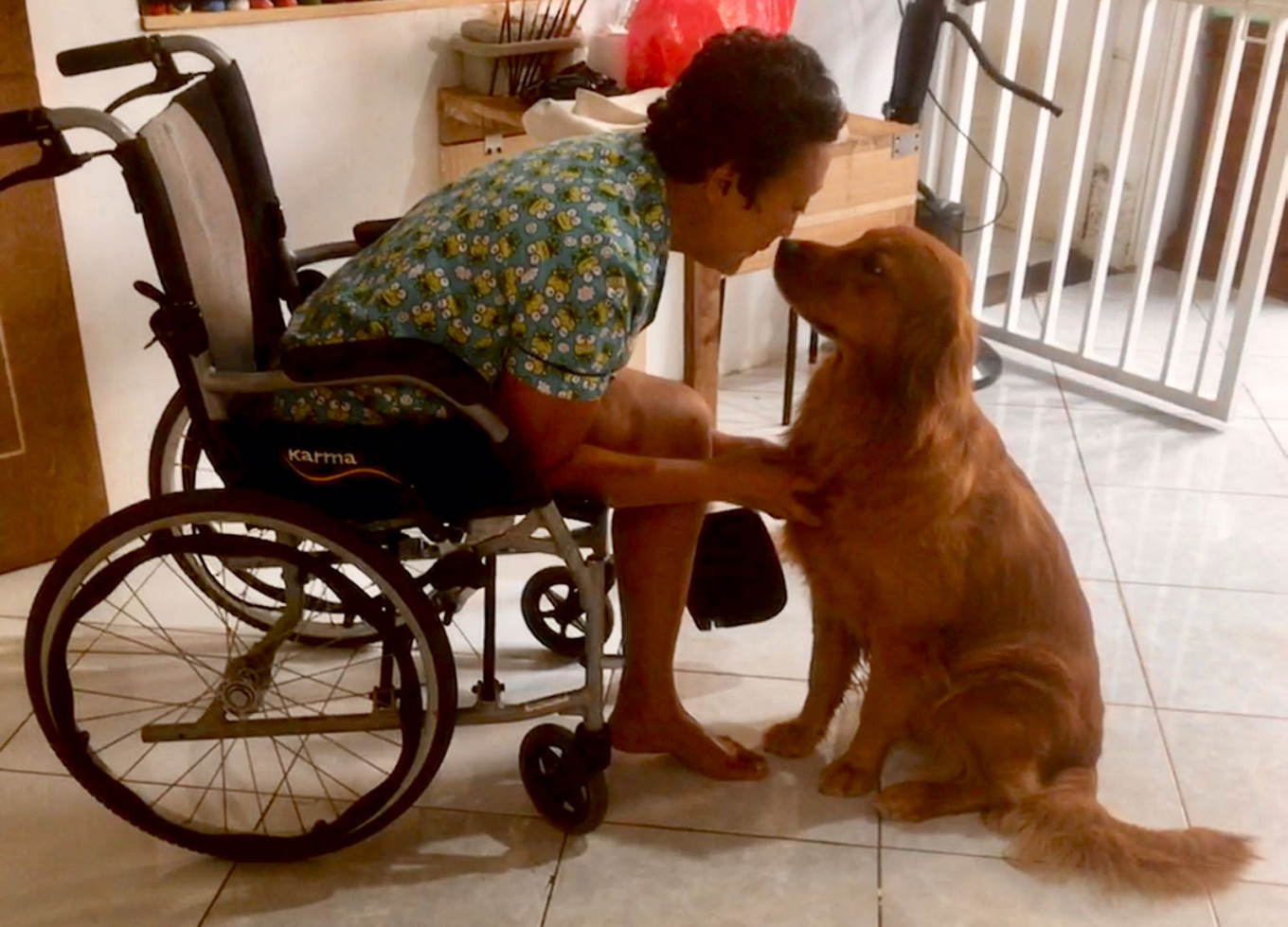But for the love of a dog: Surviving cancer with canine care
Cancer survivors say they wish they had more access to service dogs in Indonesia so they can develop their self-reliance and have more independence.
Change Size
 Dependable companion: Benedicta Bono, 61, an amputee and cancer survivor, depends a lot on her relationship with her golden retriever, Audi. (Courtesy of Benedicta Bono) (Personal collection/Courtesy of Benedicta Bono)
Dependable companion: Benedicta Bono, 61, an amputee and cancer survivor, depends a lot on her relationship with her golden retriever, Audi. (Courtesy of Benedicta Bono) (Personal collection/Courtesy of Benedicta Bono)
C
em>Cancer patients wish they had more access to service dogs in Indonesia so they can develop their self-reliance and have more independence.
"I think my friend and I would benefit from having a service dog," says Benedicta Bono, 61, who has been dealing with soft tissue sarcoma in her right leg for five years.
Two years ago, she asked for a puppy while recovering from a coma.
Yanti Depe, her longtime friend, recalls the first thing Benedicta said when she woke up from her following an amputation in July 2021: “‘I want a golden retriever.’”
"Yanti showed me a few photos of different puppies, but I always picked Audi, even though they had changed the photos several times," Benedicta says about seeing Audi, her female golden retriever service dog, for the first time.
Audi comforted Benedicta when she was having trouble breathing, and also detected her tumor, which led to a second amputation in September 2021.
Studies show that dogs sniff, lick and nip at melanoma lesions on their owner’s skin, even when they were clothed, helping to alert their owners detect their cancer early and get medical attention.
Dogs generally have more powerful instincts than human beings, explains veterinarian Rajanti Fitrianti. Dogs also have a heightened sensitivity to vibrations and a more developed sense of smell.
"The cells are constantly vibrating. The frequencies of healthy and diseased cells are distinct. Dogs that have been trained to recognize these [signals] are better at detecting tumors and malignant tissues in the human body," she says.
Yanti also recalls that Audi was sometimes left alone at home as a young pup while Yanti stayed with Benedicta at the hospital. And when Benedicta finally came home, Audi "mirrored" the pain Benedicta was feeling.
After recovering from her most recent amputation, Benedicta declared that Audi was her "hero". And whenever Audi sensed that she had forgotten to take her medication, the dog gave her a gentle nudge.
Support & companionship
Patricia Bunadi, 42, is battling Stage 3 ovarian cancer. She recalls relying on support from her dog, Louwey, who was 14 when he died. Louwey was also special because an acquaintance of her father gave him to her.
Patricia recounted how, in 2014, she was suffering such incredible pain that she passed out. Louwey barked until a neighbor heard.
"One of the neighbors eventually came into my house, found me on the floor and helped me out," she said.
It was while her husband was away on business that Patricia began thinking about getting a service dog that could be trained to detect a decline in her health and alert emergency personnel.
"With his presence, I eventually became more stable mentally because I no longer felt lonely," Patricia says of Louwey.

Clinical psychologist Henny Wirawan says service dogs are essential because their owners need a companion, and having an animal companion can help alleviate stress, especially for people who love animals.
"Clients who own dogs generally say they find their [pets] highly entertaining," she says.
And though animals can’t speak, Henny continues, they can provide comfort because they act as if they are saying: "You are not alone, I’m here for you."
The action a pet takes can be vital “for people who have recently learned that they have a serious medical condition", Henny adds.
Moreover, a study titled “Psychosocial and Psychophysiological Effects of Human-Animal Interactions: The Possible Role of Oxytocin” published in Frontiers in Psychology states that scientists have linked the release of oxytocin to animal interaction.
Also known as “the feel-good hormone”, oxytocin has multiple functions in the human body, including lowering a person’s blood pressure and heart rate, slowing down breathing and halting the production of stress hormones. These all help to induce a sense of peace and calm.
The beagle's human companion says assistance dogs generally have an uncanny knack for sensing how their owner is feeling. So if their owner is feeling bad, the dog will try everything they can to make their owner feel better, such as by sitting close to them.
But Yanti says that most places in the country still don't allow dogs, mostly because many Indonesians are Muslim and believe that a dog's saliva is haram.
Benedicta, for example, is mobility impaired, so “without a rule that permits service dogs to access public spaces, they cannot support their owners”, she says.
"As a result, people like Benedicta are unable to be more self-reliant."
Training & other challenges
Training a service dog presents its own difficulties.
Asti Budicahyani, the founder of Furry Pawsitive, a Cibubur-based companion animal behavior and training service, recently revealed that the main obstacle was people’s negative perception of dogs. The lack of a national regulation that protects service dogs also left them vulnerable to fear and rejection from other people in public places like malls, trains and other public transportation.
Each country has its own set of regulations on service animals. According to the International Guide Dog Federation (IGDF), every guide dog entering Japan must be certified by a local affiliate, and a dog brought into Japan for mobility or hearing support must be trained by a member of Assistance Dog International (ADI).
The United States, meanwhile, has two categories for service dogs: those that perform a specific task and those that merely accompany their owners in public. Service dogs are also recognized by the 1990 Americans with Disabilities Act (ADA), which prevents discrimination against people with disabilities who relies on a service dog by requiring all places open to the public, including facilities run by government, businesses and nonprofits.
Furthermore, not all trainers are able to accept a person’s request to train their dog, as the responsibilities of a service dog differ significantly depending on their owner’s condition. For example, medical alert dogs receive scent training.
In addition, different breeds have different innate behaviors and traits, so while a particular dog breed could be trained to retrieve objects, it's not guaranteed that the breed is capable of or even acceptable for training as a medical alert dog.
Besides, training a dog is a formidable task in and of itself. Asti says a dog must have a consistent disposition to be eligible for training. It can't be violent or easily become stressed and nervous, because its owners depend on it.
"Puppies can begin training as young as 14 months, but must pass a temperament test first. Not every Labrador or golden retriever can be a service dog," says the 32-year-old dog trainer.
She also says a dog must not have experienced any trauma or negative experiences, which could disrupt or worse, cause them to fail their training. This includes having been bitten by another dog or being treated poorly.
At Furry Pawsitive, Asti explains, service dogs are trained using a positive approach and excludes the use of aversive methods or equipment like a choke chain. In positive reinforcement, a dog is rewarded for good behavior with food, attention or other things it enjoys, and is one of the most effective ways to mold or alter canine behavior.
"The aim of the positive method is not to produce 'obedient' or 'disciplined' animals, but rather animals that feel safe enough to connect with their humans. As a result, the relationship has less contention and rivalry," she says.
Another thing owners might consider is the substantial time and money involved in training a service dog. A one-hour training session can cost between Rp 800,000 (US$53) and Rp 950,000 for a 1-hour, keeping in mind that a dog will pass the training to become a service dog.
Meanwhile, as The Jakarta Post reported last November, Indonesia lacks accessibility infrastructure, which also hampers the use of service dogs.
Read also: How non-inclusive public transportation alienates disabled Indonesians
But for now, the hope for more service dogs in Indonesia stands a chance.
"Whether you train your service dog [yourself] or hire a professional, you must follow animal training and welfare studies. If assistance dogs become prevalent in Indonesia, I hope people will have the respect to ask before stroking or distracting them," Asti cautions.
"I think we all need support, a friend, especially dog lovers, because there are times when I don't need to depend too much on [another person]," says Benedicta.









